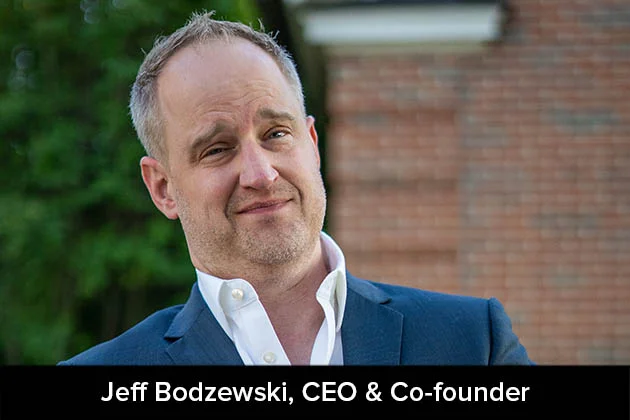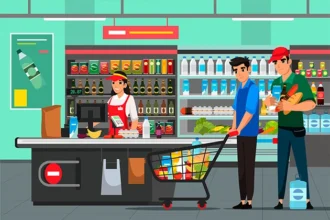It is a well-known fact from behavioral research that recognizing consumers’ new beliefs, habits, and peak moments are critical to motivating people to drive behavioral change. Because of technological advancements, everything is now available at the fingertip of consumers. This digital adoption of the younger generation would take a new turn when brands introduce them to the virtual worlds.
Technology companies like Wool & Water are bringing this technology of the virtual world to the consumer to experience in their real life. They have emerged as the leader in developing shoppable Metaverse tech products for companies to enhance their sales and conversion rates by delivering both confidence and convenience.
Story of the inception
To understand how Wool & Water is bringing in a new experience for its users, we had its CEO and co-founder, Jeff Bodzewski, speak to the CEOViews team. Jeff has worked in digital spaces for various tech giants, helping them build brands, execute digital marketing strategies, and gain insights into consumer behavior. With all this experience, Jeff is now trying to disrupt the way people shop.
As it all started, Jeff says, “We witnessed the fastest, most pronounced change in shopping behavior in mid-2020 as the average consumer became proficient at using QR codes, AR filters on social media, and VR headsets for activities beyond gaming. The digital transformation had become a buzzword with little meaning and had completely failed B2C companies when it was needed most to replace physical store sales. Justin and I recognized that augmented reality is the bridge between physical and digital by offering shoppers both the convenience of digital and the confidence of physical.”
We’re the first to link the shoppable AR experience directly to a company’s e-commerce and CRM solutions as a seamless part of a website or app.
This opened a new avenue for e-commerce and retailers to provide a novel experience for their customers. Since no brands were taking advantage of this, Jeff jumped into the action. He started Wool & Water to help e-commerce brands adapt to this new age of technology and provide an entirely new experience to their customers.
Trends in the market
Technology has been changing rapidly, and it’s driving various changes in the products that we see these days.
Web3.0 and the Metaverse have the potential to transform every aspect of our lives, from how we socialize with friends to shopping for physical goods. We are years away from a fully immersive and virtualized world as envisioned in movies such as Wall-E, yet the digital building blocks of that future are Wool & Water’s focus today.
Arguably, the most important focus for the company is helping companies navigate the hype around the Metaverse. Far too many of the dot-com era’s mistakes are being repeated, from unnecessarily complicating the checkout experience to a misguided focus on impressions over financials. Web3.0 and blockchain will transform all facets of a company, including customer care, supply chain, and research & innovation, by enhancing transparency, immediacy, and collaboration.
They are actively creating that future across devices where a shopper may interact with their favorite store’s virtual assistant on their mobile phone.
Shoppable AR is the common element in all iterations of what the Metaverse is today and will become, whether it’s a retailer virtualizing a physical store or building its own Metaworld in Web3.0 that will eventually replace the website today. Wool & Water’s leadership team is very focused and pragmatic about introducing a new digital technology until it drives measurable business and financial impact, but they are also diligent about companies not being caught unprepared as in April 2020.
Focus on innovation
For Wool and Water, innovation has been right at the core, and it drives all the processes for the organization. Jeff believes that bringing innovation only to make one isn’t the right choice. But, it should be the right innovation that brings in cultural or behavioral changes in the people using it, making their life better.
We’re the first to link the shoppable AR experience directly to a company’s e-commerce and CRM solutions as a seamless part of a website or app.
The firm has been very pragmatic and passionate about the opportunities that Metaverse is going to offer. They had nearly a year’s head start in building, adapting, and perfecting their approach to shopping in the Metaverse, which differs significantly from how retailers are approaching it today.
It is a significant advantage for the brands because it empowers shoppers to buy physical goods and services through branded Metaverse shopping worlds as well as AR and VR shopping tools that can be seamlessly integrated with a company’s own website or app. As a tech company, they have learned how to make our technology more intuitive and remove friction from the checkout process.
Culture
For a budding startup-like Wool and Water, culture is everything. A culmination of the right-minded people is what brings harmony in the workplace and revolutions in the market. While every person at the company has a prolific profile working with a few of the biggest names in the tech industry, it is their common goal to provide a new experience for the people that are making them stick together. They want to make sure that the human elements are intact with the ability to freely communicate with each other that can translate into their clients’ business.
The firm also ensures that amidst the vigor of innovation, they are still grounded to ensure their strategies work. It also promotes a balance between work and personal life balance.
Plans for the future
While others are still trying to figure out the basics of ARVR and Metaverse tech, they have had a significant headstart that allows them to deliver a measurable business impact from Day One to clients in industries from automotive to retail.
Our focus continues to be on maximizing and finding new revenue streams for brands that connect with consumers in ways more than just buying a product or service. We recently forecast a new, sustained $50MM revenue stream for an iconic travel destination through digital real estate and ad spend from other companies seeking to reach the town’s highly desirable travelers with automotive, apparel, and luxury goods.












